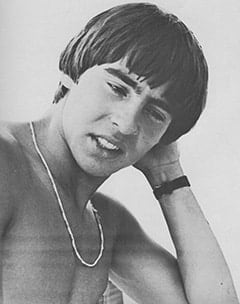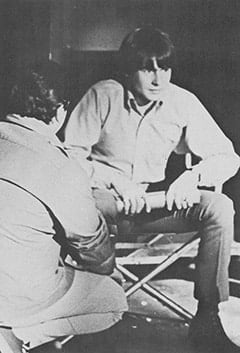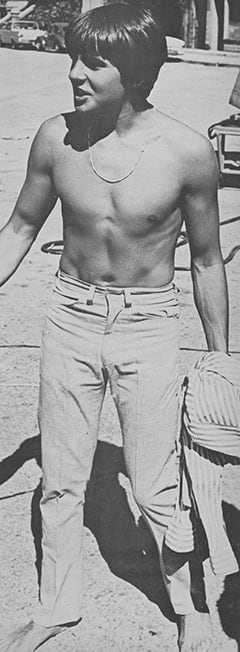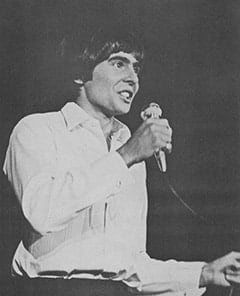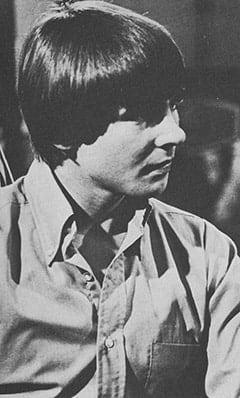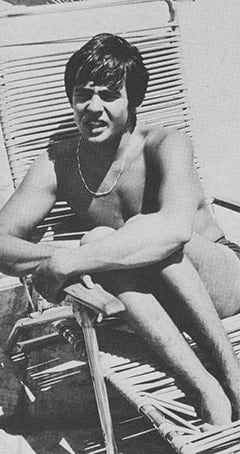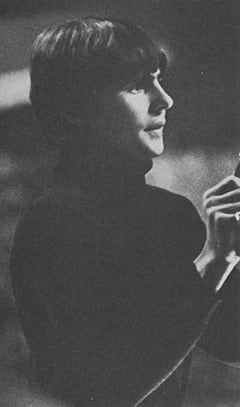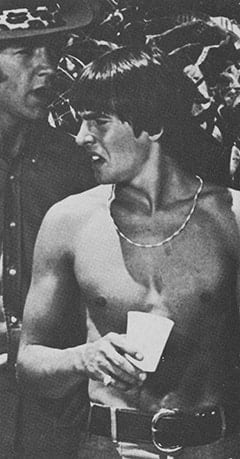It was the biggest moment in Davy’s life. His signature on the contract in front of him would make him a superstar on his own. But the word passed down from Upstairs was “No!” If he wanted to do a solo in the movies, he would have to quit the Monkees. Faced with this choice, Davy sent back the contract unsigned. It all added up to
A Very Bad Day in the Life of Davy Jones
Davy Jones is a brave trouper. But don’t let his quick smile and affable personality fool you. Davy is really a very sad young man. Look at him in an unguarded moment. The shades of sadness seem to be drawn over his happy visage. Something’s bugging Davy, but obviously he is hanging on grimly.
The story begins in Davy’s pre-Monkee days. You remember that Davy was a big smash on Broadway in Oliver. In fact, it was this performance which clinched him a spot on the Monkee team. So you can understand the emotional tie Davy has to his role in that play. It gave him his big break, and it established him as a capable performer in the legitimate theater.
Now, they’re making the movie version of Oliver, and the producers quite naturally want Davy to play his old role. When Davy heard they wanted him, he was elated. With his new fame as a Monkee, the movie people practically gave him a blank contract; he could have named his own price. This was very generous on the part of the film-makers because the show is so good that it doesn’t really need Davy in order to succeed. But how much better it would be with Davy! The kids would jump at the chance to see a new and versatile side to balance off the bum rap he’s taken in the press as a poor musician.
But what Davy wanted most, the Monkee brass wanted least. They were afraid that if Davy did a solo movie shot, it would be the beginning of the end for the Monkees. Rumors would fly that the Monkees were breaking up. It would be bad business. And so they said: “No.”
How they misjudged Davy! First of all, Davy is not the kind of cat who would louse up his buddies by walking out on them; he is too decent and considerate for that. He loves Micky, Peter, and Mike as though they were part of his own family.
When Davy got the negative answer, he couldn’t believe it. How could they do this to him? What had he done to the brains behind the Monkees to merit such shabby treatment? Wasn’t it enough to help them make a million dollars? Were they trying to squeeze every last ounce of profits out of Davy before letting him wing it on his own?
Needless to say, Peter and Micky and Mike were sympathetic to Davy. They knew how much the role in Oliver meant to him. They couldn’t understand why nobody considered Davy’s feelings—after all, he would be gone for only a few months. Let’s face it, show biz can often turn the milk of human kindness sour. Everything is measured in dollars and cents. But you can’t put a value on Davy’s tears.
Yes, when the phone call came that turned Davy’s request down, tears came to his eyes. Davy cried. It wasn’t because he wouldn’t be able to play the part—those would be selfish tears. He cried because his feelings were hurt; he didn’t expect gratitude, only a little consideration. Shortly after, when the big brass sent him a birthday card, Davy tore it up. You don’t slap a person with one hand and pat him on the head with the other.
Davy describes the experience of refusal in his own words: “It choked me up, it really did. I would have loved that part. And I’ll tell you this—whoever gets the role will win an Oscar. See if I’m not right.”
And some day, Davy will win an Oscar. See if I’m not right.
